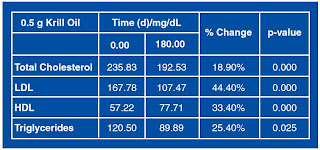Neptune Krill Oil, the "New" or "Better" Fish Oil?
Its not yet in everyone's mouth, but its gaining public interest: Krill Oil, i.e. fatty acids derived from the foodstuff of whales. In a recently republished study, Canadian scientists (Bunea. 2004) have investigated the effect on Neptune Krill Oil (NKO) in the clinical course of hperlipidemia and found that supplementation with 1 g and 1.5 g krill oil daily resulted in a reduction of glucose, total cholesterol, triglycerides, LDL, and HDL, compared to both fish oil and placebo. This led the scientists to conclude:
The superiority of krill oil vs. fish oil, certainly is of particular interest. The exact biochemical reasons underlying these effects do yet still have to be investigated. My personal opinion is that the superiority of krill oil may well be related to other components of the krill oil, i.e. not only the fatty acid composition, but rather due to compounds such as the powerful antioxidant astaxanthin.The results of the present study demonstrate within high levels of confidence that krill oil is effective for the management of hyperlipidemia by significantly reducing total cholesterol, LDL, and triglycerides, and increasing HDL levels. At lower and equal doses, krill oil was significantly more effective than fish oil for the reduction of glucose, triglycerides, and LDL levels.
 |
| Table 1: Effect of a Lower Maintenance Dose of Krill Oil on Lipids (Bunea. 2004. Table 7) |


